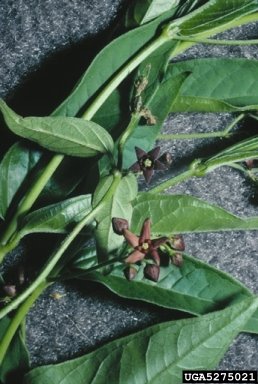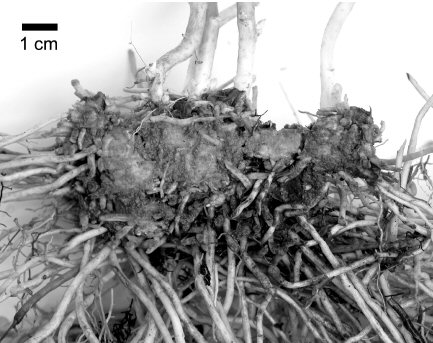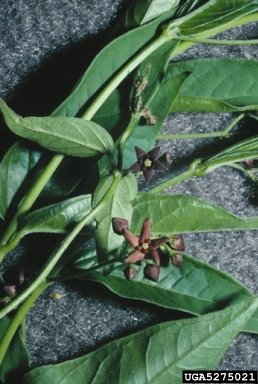The older man with the Coke-bottle lenses at the Boston GreenFest had a simple table — just a poster with a few pictures taped to it, and a sprig of something green. He looked grim and earnest, and although all the other booths were more alluring, full of enticing pamphlets about new green nonprofits, I went over to talk to him.
“Hey, I know that plant!” I said, picking up the sprig.
 Lush looks can be deceiving.It’s a dark green vine, with pods that look like small reddish peppers. A variety of Swallow-wort (Vincetoxicum), brought in as an ornamental plant from Ukraine and Russia at the turn of the last century, it’s known by several names, including my favorite, “Dog Strangling Vine.” In the later summer, the pods burst and millions of white spores float out and reseed.
Lush looks can be deceiving.It’s a dark green vine, with pods that look like small reddish peppers. A variety of Swallow-wort (Vincetoxicum), brought in as an ornamental plant from Ukraine and Russia at the turn of the last century, it’s known by several names, including my favorite, “Dog Strangling Vine.” In the later summer, the pods burst and millions of white spores float out and reseed.
Once you begin to see it, you find it is everywhere — a New England kudzu, climbing trees along the highway, creeping along a neighbor’s fence, inhabiting every vacant lot. And it dominates the north side of the JP Green House yard, a small hillside with otherwise great potential for terraces of berries. It takes root in any abandoned, neglected space (yep — that would be us!).
“I’ve been fighting this stuff all summer,” I told him cheerfully. Just the weekend before we had hosted a work-party and ten friends had stripped the hillside of all visible green vines. Uprooting it entirely, however, was almost impossible. It was a rhizome and spread underground.
Invasive Plants Man shook his head wearily and began his tirade. This stuff had to be stopped. If it wasn’t contained now it would smother out all the native plants. And the problem was, nobody knew what it was. People looked around and they saw green and thought that all was well. The knowledge of what was native and proper, and what was a ruthless killer, had been lost at least a generation ago.
He talked of his struggles with the upscale town of Brookline, where the seriousness of the threat was not recognized. He gestured despairingly at his fellow tablers: “They don’t take this seriously!”
“I take this seriously!” I assured him, slipping into a soothing maternal attitude out of habit, since I’m used to being around worked-up environmentalists.
He reached over and grabbed my arm for emphasis: “It’s just you and me against a billion tiny spores!”
Egads!
 With roots like these, who needs enemies?I became dutifully obsessed with this Hillside Strangler. I plucked it out of people’s yards at parties and presented them with an ominous synopsis of the coming invasion. I Googled late into the night, finding wonderful quotes like this one, from Canadian ecologist Waysel Bakowsky: “We stand to lose our natural ecosystem, all our native plants.”
With roots like these, who needs enemies?I became dutifully obsessed with this Hillside Strangler. I plucked it out of people’s yards at parties and presented them with an ominous synopsis of the coming invasion. I Googled late into the night, finding wonderful quotes like this one, from Canadian ecologist Waysel Bakowsky: “We stand to lose our natural ecosystem, all our native plants.”
Various methods of conquering the DSV were suggested. You can burn it, soak the seeds in alcohol or gasoline, or boil them. (Why not dynamite, or arsenic? Nuclear radiation?)
Amidst the hysteria, there were a few voices of reason, and I clung to them. Just keep chopping it down, they said — it will eventually lose heart. And till, till, till the soil, then plant native plants — tough ones.
It’s July, one year later, and we are still at war. Our denuded hillside is covered with ugly blue tarps, through which Ken has hopefully planted raspberries. The DSV bursts through in places — like the creature in Alien bursting out of its hapless victim’s stomach — looking animate, grotesquely healthy, ready to crawl up your legs. It’s also spilling over the sides of the tarp, and displacing the rocks in Simon’s rock garden (“Hey, someone moved my rocks!”).
I arm myself with our six-foot scythe, and Kuba with the Japanese hedge-trimmers, and we hack off the pods before they burst into those “billion tiny spores.” I think I will need to talk to the city before I decide to douse our brush pile with gasoline though.
If only Invasive Plants Man could see me and my 10-year-old putting our anger issues to work so constructively. It’s all for love, really. Go raspberries!



